The beautiful hearts of Nurses
From Florence Nightingale to Mary Seacole, Mother Teresa and onwards.
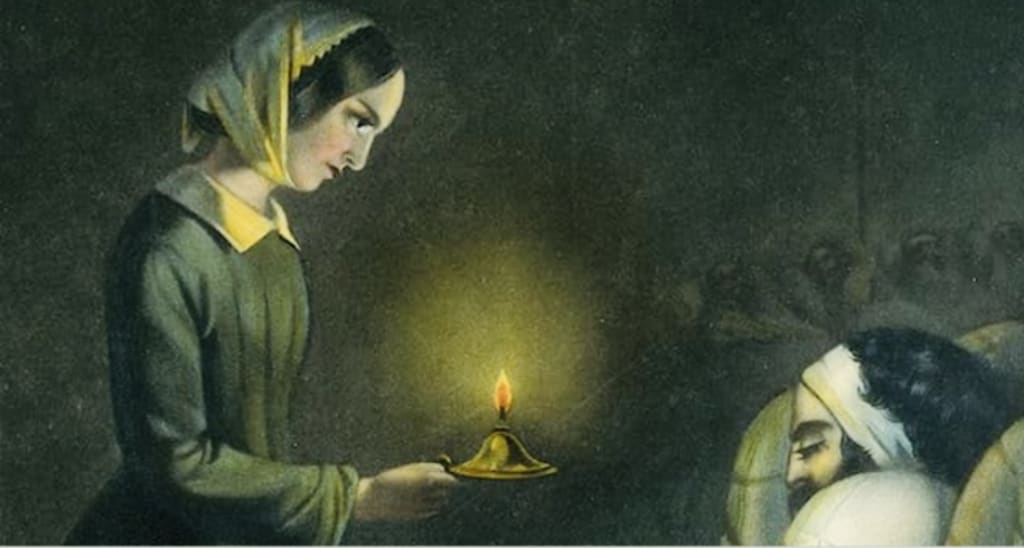
The Nightengale Training School for Nurses - St. Thomas Hospital, London. Est.1860.

Established on 9 July 1860 by Florence Nightingale, the founder of modern nursing, it was a model for many similar training schools through the UK, Commonwealth and other countries for the latter half of the 19th century. It is primarily concerned with the education of people to become nurses and midwives.
Traversing through time
I have been wracking my brain trying to see where I would have fitted in long, long ago and maybe somewhere far away. Would I have sat with King Arthur's knights at the round Table, walked between the shadows with Vlad Dracule Dracula, or flown with witches on fabled broomsticks. Would I have been an Amelia Earhart, that dashing non-conformist, spelunked in caves seeking archaeological discoveries, or rode as a knight errant, leading men into battle like Joan of Arc.
How I would have loved to run with Sherlock and Watson upon the English moors, and in the back alleyways of nefarious and wicked night prowlers, daring danger and pitting my mind against the sheer genius of the man.
To share moments with Maya Angelou as she wrote her book, "I Know Why the Caged Bird Sings" and other works. Alice Walker for her book "The Color Purple" in 1983, which was also adapted into a film. Other Black female authors including Angela Davis, Terry McMillan, Audre Lorde, Tony Morrison, Elaine Welteroth, Angie Thomas, Daven McQueen, Nandi Taylor, and Angel Hilson.
I would sit with Agatha Christie, Miss Marple and so many interesting and notable women trailblazers.
My moment of epiphany
Then, it happened that I had to spend two days and a night in the emergency room of the Cambridge University Hospital, UK. They were kindly watching and monitoring my angry heartbeats. Not to worry, nothing serious has emerged. Just moments that I have to watch carefully and drastically rearrange my diet.
As I lay there covered in wires, monitors hooked up to my chest, stomach, back and pretty much everywhere, I watched the lovely nurses, and handsome ones too. They flitted here, there and literally everywhere, harassed and overworked, still with genuine smiles upon their faces. I witnessed first hand the sacrifice that these souls, much like out teachers and mentors, endure every day for the health and well being of us all.
I was surrounded by mainly elderly folks in the emergency care unit. They screamed and hollered, some in pain, but most just wanted to go home. This went on all night. I think I slept for one hour, then was frightened awake by more screams.
Through all this, patients kept coming in, as some people were transferred to the wards, others were being wheeled in to take their places. It was a non-stop Friday night rotation of writhing screaming bodies.
Kind words, sympathy, empathy, patience and restraint, the likes of Gods and Angels, were exerted to the writhing mass of us annoying souls. The nurses monitored their computers, doled out medications and checked heartbeats all day and night. As one shift ran out, another magically appeared, picking up the momentum like well oiled machines.
Two small moments of complete unselfishness have stuck in my memory. I was to be wheeled to x-ray by an obviously tired young man, I chose to walk, after all, I still can walk, thank the stars. Let the wheeling be for the poor unfortunate souls who cannot. So, walking by the side of the grateful young man, holding my untied stringed gown behind me uncomfortably. A young male nurse came running after me:
"Hold on". He said, concern in his voice. "Let me tie the gown for you, so you don't have to hold unto it so uncomfortably". I was so touched that with all that he had to do, he still found a minute to care that my hands were free and uncluttered. I thanked him profusely.
After I was released, I again chose to walk out, instead of being wheeled out. Now, my son had packed a huge bag with way more than I could have used in one night (bless his soul). Not having a clue where within the maze of a hospital to find the exit to freedom, another male nurse jumped up, took my bag and walked me the entire route to the front of the hospital. I was left with a sense of awe and complete admiration and respect that went beyond words. I believe I had just met heaven's angels on earth.
At the front, nurses of every description and varying colors of dress and degrees of patience, maneuvered and not in the least bit harangued with the newly arrived mass of variously damaged and injured patients. I sat waiting and watched these professionals weave magic amongst a teeming gush of humanity.
How does one thank selfless souls like these.
Even though I was relieved to be sent home, and felt a kind of freedom in being fortunate enough to leave, I wished that I could have somehow lent a hand somewhere within that monster of an institution. I imagined the great and colossal magnitude of activities that went into the day to day turning of the wheels and cogs of this life saving machine called a Hospital.
I found a new respect for these awesome nurses who were actually the heartbeat of any hospital. They are the first faces you see when you arrive, and the last to wish you good luck upon your life as you leave. Doctors take second place in my book, you only see then for a minute then they are gone, bless their souls.
And so, I choose to be 'The Lady with the lamp'.
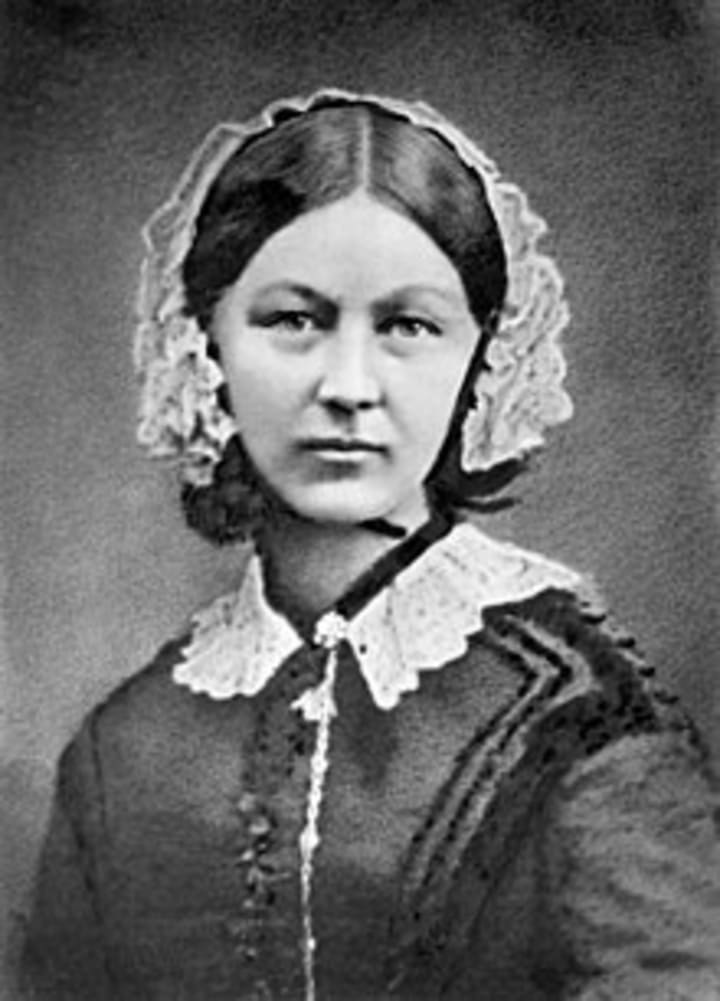
During the Crimean war, Florence gained the nickname "The Lady with the Lamp" from a phrase in a report in The Times:
She is a "ministering angel" without any exaggeration, in these hospitals, and as her slender form glides quietly along each corridor, every poor fellow's face softens with gratitude at the sight of her. When all the medical officers have retired for the night and silence and darkness have settled down upon those miles of prostrate sick, she may be observed alone, with a little lamp in her hand, making her solitary rounds.
— Cited in Cook, E. T. (1913). The Life of Florence Nightingale. Vol. 1, p. 237.
The phrase was further popularized by Henry Wadsworth Longfellow's 1857 poem "Santa Filomena".
Lo! in that house of misery
A lady with a lamp I see
Pass through the glimmering gloom,
And flit from room to room.
Florence Nightingale was born on 12 May 1820 into a wealthy and well-connected British family at the Villa Colombaia, in Florence, Italy, and was named after the city of her birth. The family moved back to England in 1821, with Nightingale being brought up in the family's homes at Embley, Hampshire, and Lea Hurst, Derbyshire
Florence inherited a liberal-humanitarian outlook from both sides of her family. (Florence's maternal grandfather) was the abolitionist and Unitarian William Smith. Nightingale's father educated her admirably.
A BBC documentary reported that "Florence and her older sister Parthenope benefited from their father's advanced ideas about women's education. They studied history, mathematics, Italian, classical literature, and philosophy, and from an early age Florence, who was the more academic of the two girls, displayed an extraordinary ability for collecting and analyzing data which she would use to great effect in later life.
In 1838, her father took the family on a tour in Europe where she was introduced to the English-born Parisian hostess Mary Clarke, with whom Florence bonded. She recorded that "Clarkey" was a stimulating hostess who did not care for her appearance, and while her ideas did not always agree with those of her guests, "she was incapable of boring anyone." Her behavior was said to be exasperating and eccentric and she had little respect for upper-class British women, whom she regarded generally as mainly inconsequential. She said that if given the choice between being a woman or a galley slave, then she would choose the freedom of the galleys. She generally rejected female company and spent her time with male intellectuals. Clarke made an exception, however, in the case of the Nightingale family and Florence in particular. She and Florence were to remain close friends for 40 years despite their 27-year age difference. Clarke demonstrated that women could be equals to men, an idea that Florence had not learnt from her mother. (I too, would have loved Mary).
Florence underwent the first of several experiences that she believed were calls from God in February 1837 while at Embley Park, prompting a strong desire to devote her life to the service of others. In her youth she was respectful of her family's opposition to her working as a nurse, only announcing her decision to enter the field in 1844. Despite the anger and distress of her mother and sister, she rejected the expected role for a woman of her status to become a wife and mother. Florence worked hard to educate herself in the art and science of nursing, in the face of opposition from her family and the restrictive social code for affluent young English women.
Florence was described as attractive, slender, and graceful. While her demeanor was often severe, she was said to be very charming and to possess a radiant smile. She resisted many suitors, saying that marriage would interfere with her ability to follow her calling to nursing.
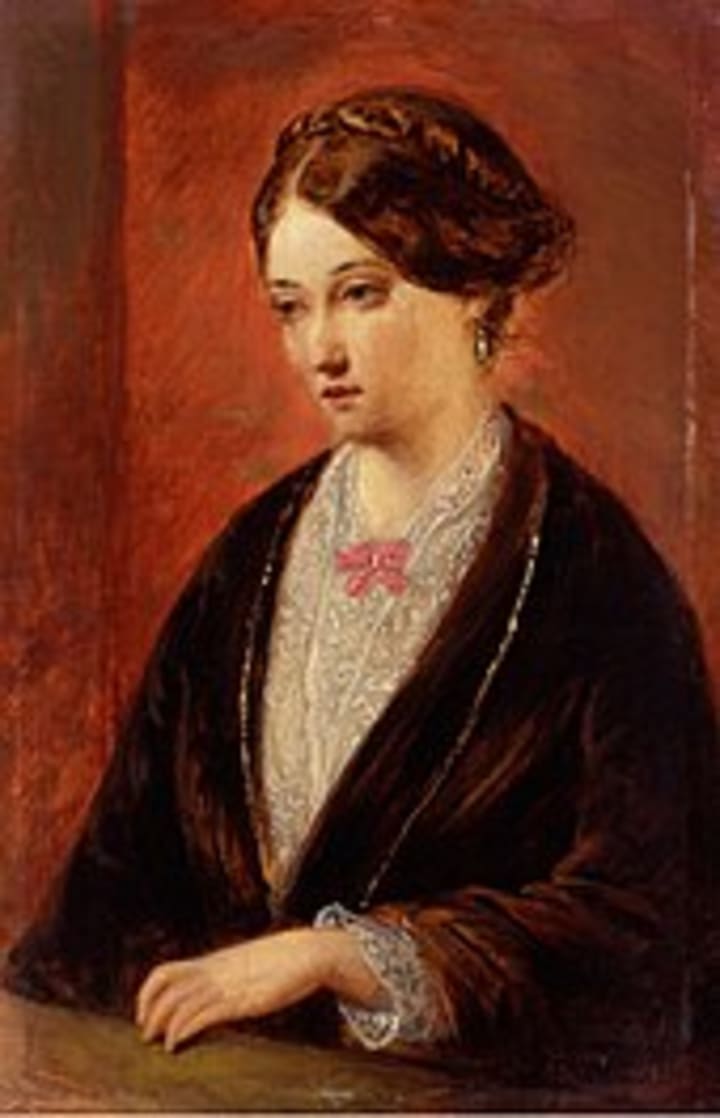
While in Athens, Greece, Nightingale rescued a juvenile little owl from a group of children who were tormenting it, and she named the owl Athena. Nightingale often carried the owl in her pocket, until the pet died.
Her writings are testimony to her learning, literary skill, and philosophy of life. Sailing up the Nile as far as Abu Simbel in January 1850, she wrote of the Abu Simbel temples:
"Sublime in the highest style of intellectual beauty, intellect without effort, without suffering ... not a feature is correct — but the whole effect is more expressive of spiritual grandeur than anything I could have imagined. It makes the impression upon one that thousands of voices do, uniting in one unanimous simultaneous feeling of enthusiasm or emotion, which is said to overcome the strongest man.
"God called me in the morning and asked me would I do good for him alone without reputation".
ln 1850, she visited the Lutheran religious community at Kaiserswerth-am-Rhein in Germany, where she observed Pastor Theodor Fliedner and the deaconesses working for the sick and the deprived. She regarded the experience as a turning point in her life, and issued her findings anonymously in 1851; The Institution of Kaiserswerth on the Rhine, for the Practical Training of Deaconesses, etc. was her first published work. She also received four months of medical training at the institute, which formed the basis for her later care.
Her father had given her an annual income of £500 (roughly £40,000, (US$65,000 in present terms), which allowed her to live comfortably and to pursue her career. Queen Victoria rewarded Nightengale's work by presenting her with an engraved brooch, known as "The Nightengale Jewel", with a prized grant of $250,000 from the British government. Florence used the money to fund the St. Thomas Hospital and Nursing school in London.
Florence Nightingale's most famous contribution came during the Crimean War, which became her central focus when reports got back to Britain about the horrific conditions for the wounded at the military hospital on the Asiatic side of the Bosporus, opposite Constantinople, at Scutari (modern-day Üsküdar in Istanbul). Britain and France entered the war against Russia on the side of the Ottoman Empire. On 21 October 1854, she and the staff of 38 women volunteer nurses including her head nurse Eliza Roberts and her aunt Mai Smith, and 15 Catholic nuns (mobilised by Henry Edward Manning) were sent (under the authorization of Sidney Herbert) to the Ottoman Empire. On the way, Nightingale was assisted in Paris by her friend Mary Clarke. The volunteer nurses worked about 295 nautical miles (546 km; 339 mi) away from the main British camp across the Black Sea at Balaklava, in the Crimea.
Nightingale arrived at Selimiye Barracks in Scutari early in November 1854. Her team found that poor care for wounded soldiers was being delivered by overworked medical staff in the face of official indifference. Medicines were in short supply, hygiene was being neglected, and mass infections were common, many of them fatal. There was no equipment to process food for the patients.
This frail young woman ... embraced in her solicitude the sick of three armies. Said Lucien Jean-Baptiste Baudens.
After Nightingale sent a plea to The Times for a government solution to the poor condition of the facilities, the British Government commissioned Isambard Kingdom Brunel to design a prefabricated hospital that could be built in England and shipped to the Dardanelles. The result was Renkioi Hospital, a civilian facility that, under the management of Edmund Alexander Parkes, had a death rate less than one tenth of that at Scutari.
Stephen Paget in the Dictionary of National Biography asserted that Nightingale reduced the death rate from 42% to 2%, either by making improvements in hygiene herself, or by calling for the Sanitary Commission. For example, Nightingale implemented handwashing in the hospital where she worked.
Florence Nightingale, an angel of mercy. Scutari hospital 1855.
During her first winter at Scutari, 4,077 soldiers died there. Ten times more soldiers died from illnesses such as typhus, typhoid, cholera, and dysentery than from battle wounds. With overcrowding, defective sewers and lack of ventilation, the Sanitary Commission had to be sent out by the British government to Scutari in March 1855, almost six months after Nightingale had arrived. The commission flushed out the sewers and improved ventilation. Death rates were sharply reduced, but she never claimed credit for helping to reduce the death rate. Head Nurse Eliza Roberts nursed Nightingale through her critical illness of May 1885.
Despite criticism, Florence still believed that the death rates were due to poor nutrition, lack of supplies, stale air, and overworking of the soldiers. After she returned to Britain and began collecting evidence before the Royal Commission on the Health of the Army, she came to believe that most of the soldiers at the hospital were killed by poor living conditions. This experience influenced her later career when she advocated sanitary living conditions as of great importance. Consequently, she reduced peacetime deaths in the army and turned her attention to the sanitary design of hospitals and the introduction of sanitation in working-class homes.
Nightingale wrote Notes on Nursing (1859). The book served as the cornerstone of the curriculum at the Nightingale School and other nursing schools, though it was written specifically for the education of those nursing at home. Nightingale wrote, "Every day sanitary knowledge, or the knowledge of nursing, or in other words, of how to put the constitution in such a state as that it will have no disease, or that it can recover from disease, takes a higher place. It is recognized as the knowledge which every one ought to have – distinct from medical knowledge, which only a profession can have".
Florence transformed nursing when she got back [from Crimea]. She had access to people in high places and she used it to get things done. Florence was stubborn, opinionated, and forthright but she had to be those things in order to achieve all that she did.
Nightingale's work served as an inspiration for nurses in the American Civil War. The Union government approached her for advice in organising field medicine. Her ideas inspired the volunteer body of the United States Sanitary Commission.
In the 1870s, Nightingale mentored Linda Richards, "America's first trained nurse", and enabled her to return to the United States with adequate training and knowledge to establish high-quality nursing schools. Richards went on to become a nursing pioneer in the US and Japan.
In 1907, she became the first woman to be awarded the Order of Merit.
From 1857 onwards, Nightingale was intermittently bedridden and suffered from depression. A recent biography cites brucellosis and associated spondylitis as the cause. Brucellosis is a zoonosis caused by ingestion of unpasteurized milk from infected animals, or close contact with their secretions. It is also known as undulant fever, Malta fever, and Mediterranean fever.
The bacteria causing this disease, Brucella, are small, Gram-negative, nonmotile, non-spore bacteria. They function as facultative intracellular parasites, causing chronic disease, which usually persists for life
Most authorities today accept that Nightingale suffered from a particularly extreme form of brucellosis, the effects of which only began to lift in the early 1880s. Despite her symptoms, she remained phenomenally productive in social reform. During her bedridden years, she also did pioneering work in the field of hospital planning, and her work propagated quickly across Britain and the world. Nightingale's output slowed down considerably in her last decade. She wrote very little during that period due to blindness and declining mental abilities, though she still retained an interest in current affairs
Death of Florence
Florence Nightingale died peacefully in her sleep in her room at 10 South Street, Mayfair, London, on 13 August 1910, at the age of 90. The offer of burial in Westminster Abbey was declined by her relatives and she is buried in the churchyard of St Margaret's Church in East Wellow, Hampshire, near Embley Park with a memorial with just her initials and dates of birth and death. She left a large body of work, including several hundred notes that were previously unpublished. A memorial monument to Nightingale was created in Carrara marble by Francis William Sargant in 1913 and placed in the cloister of the Basilica of Santa Croce, in Florence, Italy
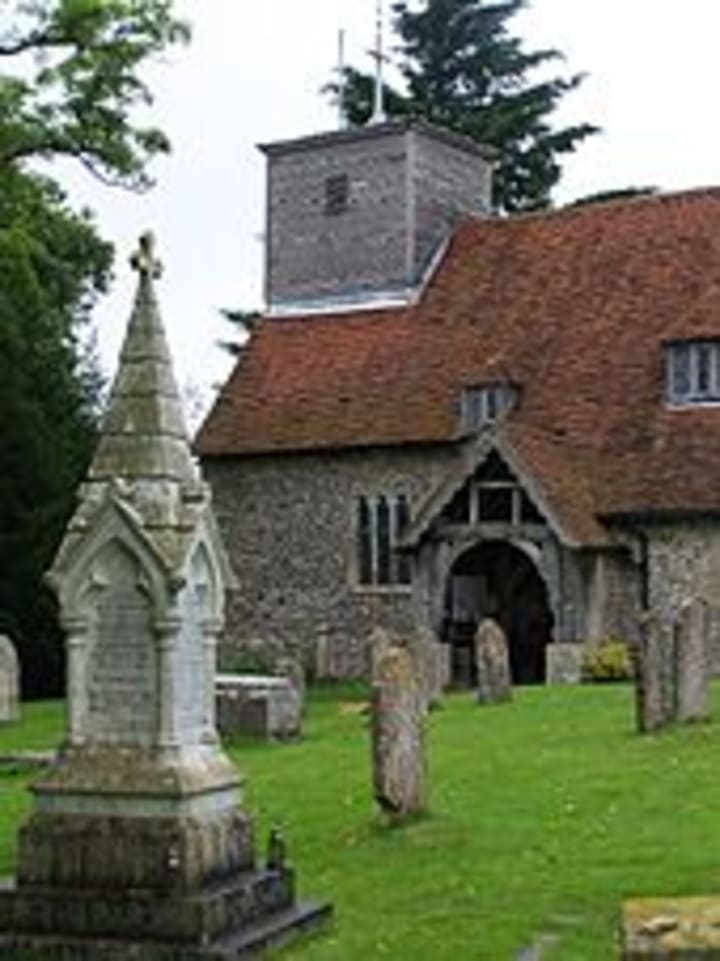
The grave of Florence Nightingale in the churchyard of St Margaret's Church, East Wellow, Hampshire.
Literature and the women's movement
Historian of science I. Bernard Cohen argues:
Nightingale's achievements are all the more impressive when they are considered against the background of social restraints on women in Victorian England. Her father, William Edward Nightingale, was an extremely wealthy landowner, and the family moved in the highest circles of English society. In those days, women of Nightingale's class did not attend universities and did not pursue professional careers; their purpose in life was to marry and bear children. Nightingale was fortunate. Her father believed women should be educated, and he personally taught her Italian, Latin, Greek, philosophy, history, and – most unusual of all for women of the time – writing and mathematics.
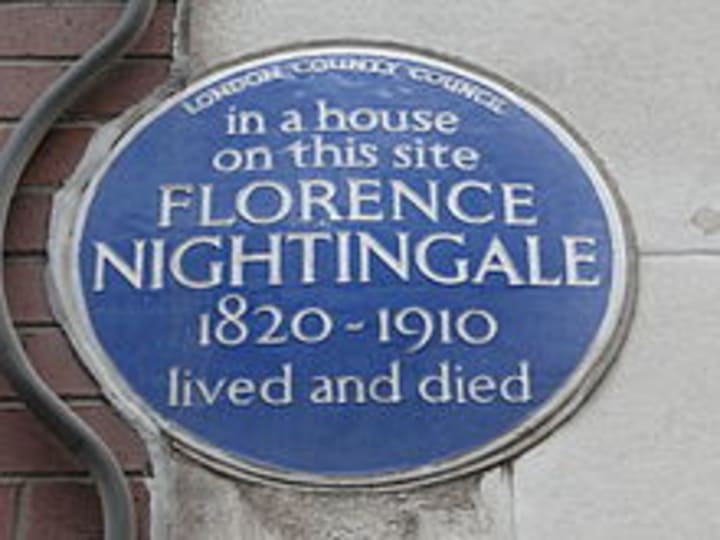
Blue plaque for Nightingale in South Street, Mayfair, London.
.......................................................................
Excerpts.
About the Creator
Novel Allen
Clouds come floating into my life, no longer to carry rain or usher storm, but to add color to my sunset sky. ~~ Rabindranath Tagore~~
Reader insights
Outstanding
Excellent work. Looking forward to reading more!
Top insights
Compelling and original writing
Creative use of language & vocab
Easy to read and follow
Well-structured & engaging content
Excellent storytelling
Original narrative & well developed characters
Expert insights and opinions
Arguments were carefully researched and presented
Eye opening
Niche topic & fresh perspectives
Heartfelt and relatable
The story invoked strong personal emotions
Masterful proofreading
Zero grammar & spelling mistakes
On-point and relevant
Writing reflected the title & theme






Comments (3)
Hospitals are no fun. There must be a rule that a patient must be poked and continuously awakened. But, the nurses are the ones with the beautiful hearts. Loved your beautiful story!!!
Florence Nightingale will always have a special place in my heart 🥺❤️ I'm so sorry about your health. I hope you're doing better now. I too was in the emergency room three months ago. I had a Supraventricular Tachycardia (SVT) attack. I have to go for a heart surgery next month. I learned so many things about Florence Nightingale today that I never knew before. I'm so glad to decided to write about her! Nurses are truly gifts from God 💖
amazing,keep it up